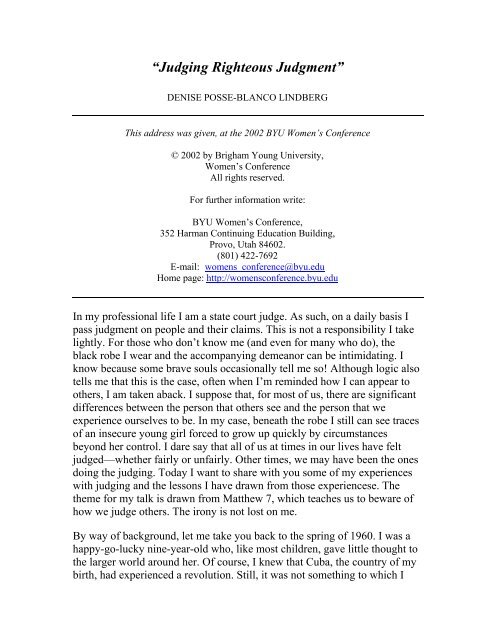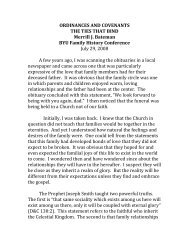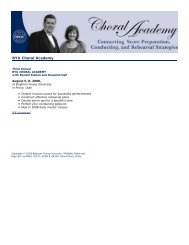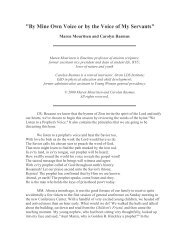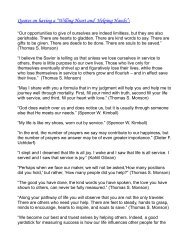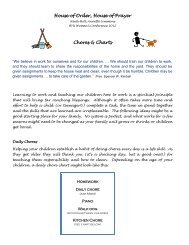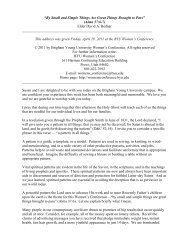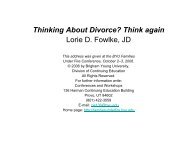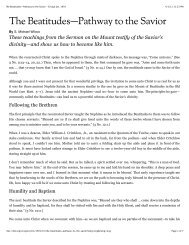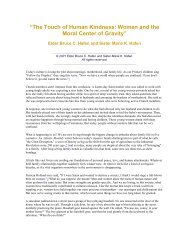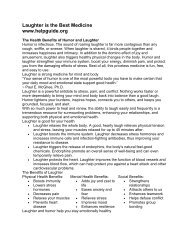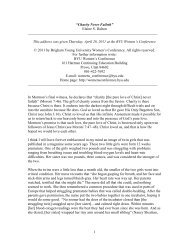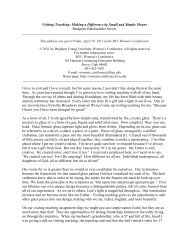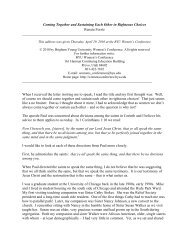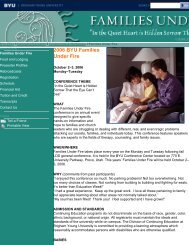Denise Posse-Blanco Lindberg - Continuing Education - Brigham ...
Denise Posse-Blanco Lindberg - Continuing Education - Brigham ...
Denise Posse-Blanco Lindberg - Continuing Education - Brigham ...
You also want an ePaper? Increase the reach of your titles
YUMPU automatically turns print PDFs into web optimized ePapers that Google loves.
“Judging Righteous Judgment”<br />
DENISE POSSE-BLANCO LINDBERG<br />
This address was given, at the 2002 BYU Women’s Conference<br />
© 2002 by <strong>Brigham</strong> Young University,<br />
Women’s Conference<br />
All rights reserved.<br />
For further information write:<br />
BYU Women’s Conference,<br />
352 Harman <strong>Continuing</strong> <strong>Education</strong> Building,<br />
Provo, Utah 84602.<br />
(801) 422-7692<br />
E-mail: womens_conference@byu.edu<br />
Home page: http://womensconference.byu.edu<br />
In my professional life I am a state court judge. As such, on a daily basis I<br />
pass judgment on people and their claims. This is not a responsibility I take<br />
lightly. For those who don’t know me (and even for many who do), the<br />
black robe I wear and the accompanying demeanor can be intimidating. I<br />
know because some brave souls occasionally tell me so! Although logic also<br />
tells me that this is the case, often when I’m reminded how I can appear to<br />
others, I am taken aback. I suppose that, for most of us, there are significant<br />
differences between the person that others see and the person that we<br />
experience ourselves to be. In my case, beneath the robe I still can see traces<br />
of an insecure young girl forced to grow up quickly by circumstances<br />
beyond her control. I dare say that all of us at times in our lives have felt<br />
judged—whether fairly or unfairly. Other times, we may have been the ones<br />
doing the judging. Today I want to share with you some of my experiences<br />
with judging and the lessons I have drawn from those experiencese. The<br />
theme for my talk is drawn from Matthew 7, which teaches us to beware of<br />
how we judge others. The irony is not lost on me.<br />
By way of background, let me take you back to the spring of 1960. I was a<br />
happy-go-lucky nine-year-old who, like most children, gave little thought to<br />
the larger world around her. Of course, I knew that Cuba, the country of my<br />
birth, had experienced a revolution. Still, it was not something to which I
gave much thought. My world revolved around my immediate family—my<br />
mother, father, and brother—and an extended family of grandparents, aunts,<br />
uncles, and cousins.<br />
Everything in my life changed that spring. Fidel Castro had come to power a<br />
year earlier, and with that, our family’s fortunes changed dramatically. My<br />
mother had worked with Fidel in the early months of the revolution but had<br />
left the movement disenchanted with its direction. The family’s money and<br />
professional status also made us suspect. In March of 1960 we were told that<br />
we would have to leave Cuba. My mother is Puerto Rican and a U.S. citizen;<br />
as her children, my brother and I also traveled with American passports.<br />
Within a matter of days we were bound for Puerto Rico, my mother’s family<br />
home; however, because my father was a Cuban citizen, he was not allowed<br />
to come with us. Almost overnight I had to leave behind the only home I’d<br />
ever known, my father, most of my family, and every material possession I<br />
had enjoyed in my short life.<br />
Three years after leaving Cuba for Puerto Rico, we moved again, this time to<br />
New York, in search of better opportunities for our family. By then my<br />
father had been allowed to leave Cuba, but his failing health prevented him<br />
from working, so Mother remained the sole breadwinner. For the second<br />
time I was uprooted from a familiar environment. Compounding the problem<br />
was the need to learn English and endure schoolmates who made my<br />
language efforts and my hand-me-down clothes frequent targets of ridicule.<br />
For a few months we lived with friends, but as soon as we could, we began<br />
looking for a place of our own in a New York City suburb. My mother heard<br />
about an apartment that she thought we could afford, so she made an<br />
appointment to see it and asked me to come along. As the building<br />
superintendent was showing us around, I turned to my mother and made<br />
some comment in Spanish. I don’t remember what I said, but I remember the<br />
reaction. Stopping, the building supervisor turned to us and asked if we were<br />
Puerto Ricans. I answered that we were Cuban refugees. I’ll never forget his<br />
response: “Well, I guess that’s OK; it’s just that we don’t rent to Puerto<br />
Ricans.”<br />
Being young, naive, and with limited command of the language, I don’t<br />
think I could have defined the words prejudice and stereotype, but what I felt<br />
was unmistakable. I felt judged, and I was found wanting. With the<br />
experience of years, I realize that those statements condemned him, not us,
ut at the time, I’m sorry to say, I felt ashamed of my heritage. I never asked<br />
my mother what she felt that day. Being a practical woman, probably all she<br />
worried about was that the apartment was in a good location at a reasonable<br />
price. As for me, to this day when I think about unrighteous judgment, I<br />
think about that experience.<br />
As a convert to the Church, I am grateful for prophetic insight into how we<br />
ought to judge. In the Prophet Joseph Smith’s translation of Matthew 7:1 we<br />
read: “Judge not unrighteously, that ye be not judged: but judge righteous<br />
judgment” (JST Matthew 7:1–2; italics added). Modern revelation thus<br />
teaches us what is prohibited: judging unrighteously. It also gives us an<br />
affirmative command to judge righteously.<br />
When I received the assignment to speak at this conference, the first thing I<br />
did was to read Elder Dallin Oaks’s seminal talk on judging.1 I must admit,<br />
however, that his talk left me in a quandary. What could I possibly add to<br />
what an apostle of the Lord—and a former judge—had already said? I didn’t<br />
think the conference organizers would allow me to fulfill this assignment by<br />
simply submitting a photocopy of his talk. Although time does not permit<br />
me to revisit his talk in full, I’d like to summarize the four principles of<br />
righteous judgment that Elder Oaks identifies:<br />
1. We’re authorized to make only “intermediate judgments.” We should not<br />
presume ourselves able to assess another’s ultimate standing vis à vis the<br />
Lord.<br />
2. Our judgments must be guided by the Spirit of the Lord.<br />
3. Judgment must be within our stewardship.<br />
4. As much as possible, judgment should be deferred until there is adequate<br />
knowledge of the facts.<br />
Elder Oaks has clearly explained that the Lord reserves to himself final<br />
judgments about persons and circumstances. By contrast, we are expected—<br />
indeed, required—to make “intermediate judgments” in order to exercise our<br />
personal moral agency.2 By “intermediate judgments,” Elder Oaks means<br />
those decisions that we must make each day as part of that eternal and<br />
inalienable right of choice—the essence of Agency.
We know that agency is an eternal principle encompassing both the ability<br />
and the freedom to choose between good or evil.3 In the opening and closing<br />
scenes of the Book of Mormon, we read how two prophets taught this truth.<br />
In 2 Nephi, Lehi instructs his son Jacob as follows: “Wherefore, the Lord<br />
God gave unto man that he should act for himself. Wherefore, man could not<br />
act for himself save it should be that he was enticed by the one or the other. .<br />
. . Wherefore, men are free according to the flesh; and all things are given<br />
them which are expedient unto man. And they are free to choose liberty and<br />
eternal life, through the great Mediator of all men, or to choose captivity and<br />
death, according to the captivity and power of the devil, for he seeketh that<br />
all men might be miserable like unto himself” (2 Nephi 2: 16, 27).<br />
At the end of this sacred book of scripture, Mormon gives similar<br />
instruction: “For behold, . . . it is given unto you to judge, that ye may know<br />
good from evil; and the way to judge is as plain, that ye may know with a<br />
perfect knowledge as the daylight is from the dark night. For behold, the<br />
Spirit of Christ is given to every man, that he may know good from evil;<br />
wherefore I show unto you the way to judge; for everything which inviteth<br />
to do good, and to persuade to believe in Christ, is sent by the power and gift<br />
of Christ; wherefore ye may know with a perfect knowledge [that] it is of<br />
God. . . . And now, my brethren, seeing that ye know the light by which ye<br />
may judge, which light is the light of Christ, see that [you] do not judge<br />
wrongfully” (Moroni 7:15–16, 18).<br />
Clearly these scriptures teach that we must make judgments in life—the<br />
question is not whether we judge but rather how we judge. Wrongful or<br />
unrighteous judgment can apply to our judgment of others as well as to our<br />
judgment of ourselves. Unrighteous judgment can often be traced back to the<br />
sin of pride. Jesus taught powerfully the connection between pride and<br />
unrighteous judgment when he asked: “Why is it that thou beholdest the<br />
mote that is in thy brother’s eye, but considerest not the beam that is in thine<br />
own eye? Or how wilt thou say to thy brother, Let me pull out the mote out<br />
of thine eye; and canst not behold a beam in thine own eye?” (Matthew7:4–<br />
5).<br />
The Lord castigates the hypocrite who presumes to tell another what is<br />
wrong with him when his own view is obscured by even greater beams, or<br />
shortcomings. The Savior is warning us against looking for fault in others<br />
when we should be working to fix our own failings, whether they result from<br />
limited or false information, hypocrisy, or sin.
One of the most powerful scriptural examples of unrighteous judgment is the<br />
account of the woman taken in adultery. As recounted in John 8, when the<br />
scribes and the Pharisees asked the Savior what should be done with the<br />
woman, He uttered a single, simple statement: “He that is without sin among<br />
you, let him first cast a stone at her” (John 8:7). Jesus forced the woman’s<br />
accusers to search their consciences before standing in judgment.<br />
Confronted with their own hypocrisy and sins, the accusers departed.<br />
Modern-day prophets continue to warn against unrighteous judgment and its<br />
root cause: pride. President Benson, taught that “pride is a sin that can<br />
readily be seen in others but is rarely admitted in ourselves. . . . It is manifest<br />
in so many ways, such as faultfinding, gossiping, backbiting, murmuring . . .<br />
envying, coveting, withholding gratitude and praise . . . and being<br />
unforgiving and jealous.”4 Each of these manifestations of pride is<br />
inextricably linked to an unrighteous judgment of others.<br />
In the field of psychology, “projection” is defined as falsely imputing to<br />
others our own feared and objectionable characteristics.5 President N. Eldon<br />
Tanner taught that “the further out of line or out of tune we ourselves are,<br />
the more we are inclined to look for error or [weakness] in others and to try<br />
to rationalize and justify our own faults rather than to try to improve<br />
ourselves.”6 A poet describes this same phenomenon as follows:<br />
It’s all so easy,<br />
when you’re on the<br />
outside looking in.<br />
[It is] all so easy<br />
to see [clearly] who is<br />
. . . wrong<br />
and [who is] the “saint.”<br />
It is only difficult<br />
When the windows
ecome mirrors.7<br />
Rarely do we get a true picture when we are on the outside looking in. Our<br />
judgments, more often than not, are based on limited and often faulty<br />
information. Perhaps that is why folk wisdom advises us to not judge others<br />
until we’ve “walked in their shoes.” And yet, on a daily basis the temptation<br />
is to make snap judgments. Those who would judge others must always<br />
remember the fundamental weakness inherent in any earthly judgment—the<br />
fact that “we cannot see what is in the heart.”8<br />
Among my responsibilities as a judge, the weightiest is to pronounce a<br />
sentence upon criminal defendants. To prepare to do so, I request that the<br />
probation department prepare a presentence report on the defendant. The<br />
report tells me the official version of the offense as well as the defendant’s<br />
version of what happened. It also tells me about the defendant’s prior<br />
criminal history (if any), about his or her educational and employment<br />
history, about any drug, alcohol or mental health treatment history, and<br />
about the defendant’s family background. In addition, the probation agent<br />
may attach other materials such as psychological reports or letters from<br />
family and friends. In all, these reports often range between nine and fifteen<br />
pages in length. I read each report and the probation department’s<br />
recommendation before the time set for sentencing. I mull over what I<br />
should do with this individual, but I do not reach a decision at that point.<br />
In court I hear from the defendant, from defense counsel, the prosecutor, the<br />
victim, and often from many of the defendant’s relatives. At that point I have<br />
about as much information as anyone could reasonably be expected to have<br />
before making a decision. What I do not—and cannot—have, is the ability to<br />
see into the heart of the defendant.<br />
I like to think I can make educated guesses about how successful a defendant<br />
will be on probation based on his past performance. The truth is that<br />
sometimes I’m wrong because “man can judge only what he sees; he cannot<br />
judge the heart or the intention, or begin to judge the potential of his<br />
neighbor.”9 Right now I have a probationer who is defying all predictions.<br />
Steve, as I will call him for purposes of telling his story, comes from a<br />
dysfunctional family, had dropped out of school at a young age, had an<br />
unstable work history, and a rap sheet as long as my arm. Although young,<br />
by the time he appeared before me he had graduated to felony-level criminal<br />
offenses. In short, there was little to commend him, and in preparing for his
sentencing I had little basis to believe that he would complete anything other<br />
than a term of incarceration.<br />
My first inkling to the contrary came on the day that Steve sat in the<br />
courtroom waiting for sentence. It was a particularly busy afternoon, and it<br />
was well past 5 P.M. when I finally got to him. Although Steve knew full<br />
well that the probation department’s recommendation was that he spend<br />
several months in jail, he patiently waited his turn. He was the last person<br />
left in the courtroom when his turn arrived and I asked him what, if<br />
anything, he wanted me to know before I sentenced him. Without offering<br />
excuses for his behavior, Steve accepted responsibility for his crime. I<br />
imposed the recommended jail term, to be followed by a lengthy probation<br />
period. I ordered him to report back to court once he was released from jail<br />
so we could review the conditions of his probation. When he appeared on<br />
the appointed day, I gave him a lengthy list of requirements: He was to pass<br />
a high-school equivalency exam, complete community service, secure stable<br />
employment or further his education, and pay fines and restitution.<br />
Defying all objective predictions based on his past record, Steve is<br />
demonstrating constructive, positive behaviors, one step at a time. When he<br />
passed his high school equivalency exam with flying colors we had a little<br />
ceremony in the courtroom in which I presented him with a gift-wrapped<br />
bottle of sparkling cider to celebrate his achievement. His wisecrack when I<br />
handed him the bottle made everyone in the courtroom laugh. “Gee,” he<br />
said, “no judge has ever given me anything other than jail!” At our last<br />
review hearing, I congratulated him on his progress and told him I was<br />
proud of him. His answer humbled me. “I’ve decided,” he said, “that I can’t<br />
do this for you; I have to do it for myself.” Steve’s answer reflects the truest<br />
measure of change—a changed heart. His story is a cautionary tale about<br />
how easy, how tragic, and how wrong it is for us to make intermediate<br />
judgments about people and circumstances even when it is our responsibility<br />
to pass judgment on others.<br />
A discussion of unrighteous judgment is not complete without turning the<br />
gaze inward. When we do so with even a small measure of honesty, we can<br />
easily see how our view of self can also be distorted. We know that pride<br />
can lead to a false sense of superiority, causing us to misjudge others. At the<br />
same time, pride can encourage us to minimize and rationalize our own<br />
shortcomings. Perhaps an even more insidious manifestation of unrighteous<br />
judgment comes in thinking too little of ourselves.
In a 1989 April general conference address, Elder Marvin J. Ashton stated:<br />
“When we take it upon ourselves to pass self-judgment and simply declare,<br />
‘I am not worthy,’ we build a barrier to progress and erect blockades that<br />
prevent [us from] moving forward. We are not being fair when we judge<br />
ourselves . . . [because] personal measurement or judgment oftentimes may<br />
be severe and inaccurate.”10<br />
In my experience women seem to be afflicted to a greater degree than men<br />
by negative personal measurement and self-judgment. To be sure, some of<br />
us rationalize our behavior and view ourselves through rose-colored lenses.<br />
Others of us take the opposite tack, choosing to view our lives through dark<br />
lenses of despair. When we do so, we become overly focused on our own<br />
shortcomings and weaknesses. We must remember that self-deprecation is<br />
not the same thing as humility. Chronic feelings of inferiority and<br />
unworthiness—unrelated to how we’re keeping the commandments—are not<br />
of God.<br />
In this context President George Q. Cannon taught: “Now, this is the truth.<br />
We humble people, we who feel ourselves sometimes so worthless, so goodfor-nothing,<br />
we are not so worthless as we think. There is not one of us but<br />
what God’s love has been expended upon. There is not one of us that He has<br />
not cared for and caressed. There is not one of us that He has not desired to<br />
save and that He has not devised means to save. There is not one of us that<br />
He has not given His angels charge concerning. We may be insignificant and<br />
contemptible in our own eyes and in the eyes of others, but the truth remains<br />
that we are the children of God and that He has actually given His angels . . .<br />
charge concerning us, and they watch over us and have us in their<br />
keeping.”11<br />
As I researched the scriptures and pondered the teachings of modern-day<br />
apostles and prophets, I gained insight that may not be novel to some of you<br />
but that resounded in meaningful ways to my heart and mind. I came to<br />
understand that the key to Matthew 7, verse 1, is found in verse 2: “For with<br />
what judgment ye judge, ye shall be judged: and with what measure ye mete,<br />
it shall be measured to you again.” Luke’s recounting of this portion of the<br />
Sermon on the Mount gives us added perspective: “Judge not, and ye shall<br />
not be judged: condemn not, and ye shall not be condemned; forgive, and ye<br />
shall be forgiven” (Luke 6:37).
After we read Luke, the words of the Lord’s Prayer came to mind with new<br />
significance: “And forgive us our debts, as we forgive our debtors . . .”<br />
(Matthew 6: 12; italics added). Several verses later we read: “For if ye<br />
forgive men their trespasses, your heavenly Father will also forgive you: But<br />
if ye forgive not men their trespasses, [then] neither will your Father forgive<br />
your trespasses” (Matthew 6:14–15).<br />
In the Book of Mormon, Alma instructs his son Corianton to the same effect:<br />
“Therefore, my son, see that you are merciful unto your brethren; deal justly,<br />
judge righteously and do good continually; and if ye do all these things then<br />
shall ye receive your reward; yea, ye shall have mercy restored unto you<br />
again; ye shall have justice restored unto you again; ye shall have . . .<br />
righteous judgment restored unto you again; and ye shall have good<br />
rewarded unto you again. For that which ye do send out shall return unto you<br />
again, and be restored; therefore, the word restoration more fully<br />
condemneth the sinner, and justifieth him not at all” (Alma 41:14–15.)<br />
The more I thought about these scriptures, the clearer it became how<br />
perfectly just God is in His approach to judging us. I realized that He gives<br />
us the opportunity to set the standard by which we will be judged: “With<br />
what measure ye mete, it shall be measured to you again” (Matthew 7:1).<br />
Our treatment of others will be perfectly mirrored in how He will treat us.<br />
God’s paradigm for judging creates the perfect incentive to do right—if for<br />
no other reason, out of self-interest!<br />
Of course, the Lord wants more than self-interest to guide our judgments:<br />
“Now the end of the commandment is charity out of a pure heart, and of a<br />
good conscience, and of faith unfeigned” (1 Timothy 1:5). Bishop H. Burke<br />
Peterson has written: “No one can be classed as a true follower of the Savior<br />
who is not in the process of removing from his heart and mind every feeling<br />
of ill will, bitterness, hatred, envy, or jealousy toward [others].”12<br />
With new eyes I reread the Golden Rule: “Therefore, whatsoever ye would<br />
that men should do to you, do ye even so to them” (Matthew 7:12). I wonder<br />
if we weren’t given this commandment because, knowing us as He does,<br />
God recognizes the me-centeredness of human nature. I believe that is why<br />
the Golden Rule first asks us to determine how we want to be treated and<br />
then tells us to apply this standard to our treatment of others. With perfect<br />
justice, God then applies this same measure in judgment of us. This insight<br />
on judgment was perfectly captured by Arthur Henry King when he said:
“Judge not, that ye be not judged” does not mean that we must not judge; it<br />
means that if we judge, we must be prepared to be judged. We must<br />
remember that we should judge in such a way that we shall not mind being<br />
judged in [that] same way. That is the point. To commit ourselves to a<br />
judgment is to be prepared to have someone else commit himself by judging<br />
us.”13<br />
Choice and judgment are inextricably linked to our growth and progression<br />
as sons and daughters of God. We are commanded to judge not<br />
unrighteously but to judge righteous judgment. It is of eternal consequence<br />
that we understand the difference between the two. The Lord’s plan in this<br />
area is perfectly clear and perfectly just: He who knows our hearts better<br />
than we do will judge us in the same manner and by the same measure as we<br />
judge others. That we may bring charity to our task of judging, being guided<br />
by “that Spirit which leadeth to do good—yea, to do justly, to walk humbly,<br />
to judge righteously” (D&C 11:12), I pray in the name of Jesus Christ,<br />
amen.<br />
Notes<br />
1. Dallin H. Oaks, “‘Judge Not’ and Judging,” Ensign, August 1999.<br />
2. Oaks, “‘Judge Not’ and Judging,” 7.<br />
3.Bruce R. McConkie, Mormon Doctrine, 2d ed. (Salt Lake City: Bookcraft,<br />
1979), s.v “agency.”<br />
4. Ezra Taft Benson, “Beware of Pride,” Ensign, May 1989, 4.<br />
5.See, for example, C. H. Patterson, Theories of Counseling and<br />
Psychotherapy (New York, Harper & Row, 1966), 187, 311.<br />
6. N. Eldon Tanner, “‘Judge Not that Ye Be Not Judged,’” Ensign, July<br />
1972, 35.<br />
7. Sharron Pitts, “Judge Not That Ye Be Not Judged,” New Era, March<br />
1985, 51.<br />
8. Tanner, “‘Judge Not that Ye Be Not Judged,’” 35.
9. Tanner, “‘Judge Not that Ye Be Not Judged,’” 35.<br />
10. Marvin J. Ashton, “On Being Worthy,” Ensign, May 1989, 20.<br />
11. Gospel Truth: Discourses and Writings of President George Q. Cannon,<br />
sel. Jerreld L. Newquist, 2 vols. (Salt Lake City: Deseret Book, 1974), 1:2.<br />
12. H. Burke Peterson, “Removing the Poison of an Unforgiving Spirit,”<br />
Ensign, November 1983, 59.<br />
13. Arthur Henry King, Arm the Children: Faith’s Response to a Violent<br />
World (Provo: <strong>Brigham</strong> Young University Studies, 1998), 129–30.


